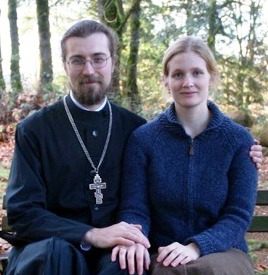 Why Gay Marriage Now?
Why Gay Marriage Now?
Not long ago, I was invited to participate in a discussion on gay marriage on a radio program of Oregon Public Broadcasting. [1] The occasion seemed timely enough—a proposition to legalize gay marriage was on a ballot in Washington, [2] a neighboring state. A few days later, I found out that the main guest on the program would be Gene Robinson, the first openly gay bishop of the Episcopal Church. Bishop Robinson had published a new book [3] which was being introduced on the show. Naturally, the author received most of the airtime. The host, Dave Miller, did allow me a few minutes in which to represent my point of view—hardly enough to even begin to develop an intelligent argument. The issue of gay marriage, however, is most certainly here to stay. Thus, I have decided to put down a few thoughts on the digital equivalent of paper.
Doesn’t the Bible Condemn Homosexuality?
Those who oppose gay marriage on biblical grounds usually point to several passages, both in the Old and New Testaments, that condemn the act of a man “lying with a male as with a woman” (Lev. 18:22 and 20:13) and women exchanging “natural intercourse for unnatural” (Rom. 1:26). Bishop Robinson follows the tradition of the Anglican Church and interprets the Scripture to be little more than a historical commentary on the primitive social state of the ancient Jews.
Charles Darwin, after all, was an Englishman. Social Darwinism—the idea that the ancients were more primitive than we are, or that we have somehow evolved compared to them—is a logical extension of biological Darwinism. It makes perfect sense that apes had more primitive morals than those of early humans, and that ours are even more sophisticated. The absurdity of this view is best discussed by G. K. Chesterton in The Everlasting Man, and we need not re-tell of it here. In some ways, however, even the traditional Christian understanding of the process by which God chose to save the human race seems to support some notion of “social Darwinism.” Was not the law of the Old Testament a schoolmaster used to bring us unto Christ (Gal. 3:24)? This suggests that the spiritual—and, presumably, moral—state of the ancient Jews had to “evolve” before the coming of the Messiah. There is an alternate point of view as well. Some note that Christ came to heal the sick and save the dying, which means that humanity was seriously ill and nearly spiritually dead just before the incarnation of the Divine Physician. [4]
So, was the condemnation of homosexuality one of the “heavy and grievous” burdens that was necessary in the pre-Christian era but became obsolete with the coming of Christ, like so many commandments of the law relating to ritual purity? The Apostle Paul seems to answer this question with a resounding “no.” The condemnation of same-gender sexual behavior appears to be reaffirmed by the apostle; and his position on the issue is not challenged by any other passage in the New Testament.
Of course, Bishop Robinson asserts that the words of Paul may have been mistranslated into English and misunderstood by contemporary readers, who are far removed from the original context in time and geography. He notes, for example, that the Greek word arsenokoitai found in 1 Cor. 6:9 and 1 Tim. 1:10 and usually translated as into English as “sodomites” (NRSV) or some other variant to mean men who have sex with men, is a “mysterious… [and] completely unknown word,” and that “we have nothing, neither internal to the Scriptures nor external to them, to give us guidance as to its meaning.” [5] In my view, such an assertion is misleading at best. While it is true that Paul appears to be coining an unusual word, the meaning of this word is far from a mystery. Stanton L. Jones of Wheaton College explains:
Leviticus 18:22 and 20:13 forbid a man lying with another man as one would with a woman. Leviticus was originally written in Hebrew, but Paul was a Greek-educated Jew writing to Gentiles in Greek, the common language of the day, and probably was using the Greek translation of the Old Testament available in that day, the Septuagint, or LXX, for his Scripture quotations.
The Greek translation of these Leviticus passages condemns a man (arseno) lying with (koitai) another man (arseno); these words (excuse the pun) lie side-by-side in these passages in Leviticus. Paul joins these two words together into a neologism, a new word (as we do in saying database or software), and thus he condemns in 1 Corinthians and 1 Timothy what was condemned in Leviticus.
Jones believes, then, that the most credible translation of what Paul is condemning in 1 Corinthians 6:9 is a person doing exactly what Leviticus condemns: engaging in homosexual sex (a man being a “man-lier”). Far from dismissing the relevance of Leviticus, Paul is implicitly invoking its enduring validity for our understanding of sexual sin, and drawing on it as the foundation of his teaching on homosexual conduct. He is saying, “Remember what it said not to do in Leviticus 18:22 and 20:13? Don’t do that!” [6]
Likewise, Robert A. J. Gangon argues that “the meaning that Paul gave to arsenokoitai has to be unpacked in light of Romans 1:24-27. When Paul speaks of the sexual intercourse of “males with males” (arsenes en arsenes) in v.27, he obviously has in mind arsenokoitai.” [7] In other words, while we may not know exactly which specific “techniques” of male-male copulation Paul may have had in mind—apparently, Paul’s sensibilities forced him to speak of this obliquely—we can be reasonably sure that the word arsenokoitai refers to men lying with men, and not to bees, or flower, or tractors, for that matter.
Semantic analysis, however, does not seem to convince those who think that they are the first humans to read the Scripture—that is to say, for those who have cut themselves off from the tradition of the Church. Cut off from the roots, people often begin to fit the Scripture to be compatible with their sins and passions, rather than to elevate their lives to the measure offered by the Scripture. After all, it was another Englishman, William Shakespeare, who wrote that even “the devil can cite Scripture for his purpose.” [8]
 However, Christians who lived in approximately the same geographical area in approximately the same era in which the New Testament was written and spoke the same language as the Apostle Paul had no reason to rely on an English translation. They seem to have understood the issue of same-gender sexual relations in much the same way as the traditional Church has always understood it. There is not a single patristic or early Christian source that interprets the words of Paul as anything but condemning homosexual acts. Neither is there a single patristic or early Christian source that discounted Paul’s teaching on this issue as some moral primitivism or “cave-man’s” thinking. In fact, there is not a single “later” Christian source that somehow “evolved” to approve of homosexual acts. In other words, even though there are some prohibitions contained in the Law—primarily dealing with the questions of ritual purity, not morality—that the Church no longer considers helpful in leading people to Christ, condemnation of homosexual acts appears to be a constant throughout the history of the Church. [9]
However, Christians who lived in approximately the same geographical area in approximately the same era in which the New Testament was written and spoke the same language as the Apostle Paul had no reason to rely on an English translation. They seem to have understood the issue of same-gender sexual relations in much the same way as the traditional Church has always understood it. There is not a single patristic or early Christian source that interprets the words of Paul as anything but condemning homosexual acts. Neither is there a single patristic or early Christian source that discounted Paul’s teaching on this issue as some moral primitivism or “cave-man’s” thinking. In fact, there is not a single “later” Christian source that somehow “evolved” to approve of homosexual acts. In other words, even though there are some prohibitions contained in the Law—primarily dealing with the questions of ritual purity, not morality—that the Church no longer considers helpful in leading people to Christ, condemnation of homosexual acts appears to be a constant throughout the history of the Church. [9]
In his book, Bishop Robinson so eloquently explains the only correct way to understand the Holy Scriptures in words that ring so true in an Orthodox context that I would like to cite here the entire passage:
Understanding Scripture in its context is no easy task, and it is fraught with potential misuse. All readers of Scripture are subject to self-deception—that is, the temptation to interpret the Scriptures in a way that satisfies our own selfish desires and biases, rather than hearing the truth of the passage that may challenge, condemn, and call into question those desires and biases. That is why Scripture must always be studied and understood in community. The temptation is too great to interpret Scripture in our own image to attempt it alone. One must always be subject to the larger community’s understanding to guard against only hearing what one wants to hear.
Part of the community whose voice needs to be considered is that of tradition—that is, what has been said over the years about any given passage of Scripture. We, in the present time, are not the only ones who have struggled with these passages, and our own understanding needs to be informed by the larger community of the faithful in the past.
We need to use our own reason and experience in interpreting these passages of Scripture. Our knowledge of science, psychology, and modern scholarly understanding needs to inform our approach to these passages. <…>
These lenses—Scripture, tradition, and reason—will allow us to look clearly at the seven verses of Scripture traditionally thought to be associated with the issue of homosexuality. To switch metaphors, Scripture, tradition, and reason are the classic “three-legged stool” of authority used in historical Anglicanism and many other religious traditions. (67-8)
While all of this sounds true enough, it makes it even more surprising that the author quickly dispenses with the first two legs of his stool. First, he declares that the words of the Scripture cannot be understood by us because they may have been mistranslated into English. Inexplicably, he makes no mention of the fact that many other people never had to translate the Scripture into English in order to understand it. Neither the Apostle Paul, nor the Apostolic Fathers, nor the Church Fathers of the first few centuries of Christianity ever had to resort to an English translation—they read the Scripture in the original language and maintained a tradition of understanding its words remarkably consistent with all traditional English translations. As for tradition, Bishop Robinson makes no mention of it beyond that which is quoted above. Having identified the tradition of the Church as one of only three legs of the stool of understanding, he then proceeds to ignore it altogether, thus leaving only his own reason to help him, self-admittedly making him “subject to self-deception—that is, the temptation to interpret the Scriptures in a way that satisfies our own selfish desires and biases, rather than hearing the truth of the passage that may challenge, condemn, and call into question those desires and biases.”
Actually, Bishop Robinson is following a tradition—that of the Anglican Church. The gradual but steady move by the Anglican Church to cut itself off from traditional Christianity dates back at least half a century—not only with respect to its “evolved” positions on homosexuality, abortion, masturbation, and other moral sins, but also with respect to the most basic Christian beliefs, such as the virgin birth, bodily resurrection, and even the very existence of God. [10] Thus, Bishop Robinson’s rejection of both the very words of the Scripture and the tradition of the Church in favor of reasoning which allowed him to divorce his wife, in a clear violation of Christ’s words, [11] and to marry a man, should be seen in the context of the Anglican Church’s divorce from traditional Christianity and its marriage to the “wisdom of this world” [12] as it celebrates Gene Robinson’s lifestyle by elevating him to the rank of a bishop. [13] It is important to note that we are not talking about giving love, compassion, and support to people whose marriage is breaking up, or to homosexual persons. In elevating Gene Robinson—a man who divorced his wife and married another man—to bishopric, the Episcopal Church set his conduct as an example for believers to follow, [14] apparently disregarding the admonition that “a bishop must be above reproach, married only once.” [15]
The Church’s History with Gay Marriage
Humans have been walking this earth for quite a long time by any account, and yet each and every one of us has to learn to take his or her first step. Brilliant writers have been composing masterpieces in poetry and prose for at least a few thousand years, and yet each one of us had to learn a first word. In fact, most of us have to spend the first couple of decades of our lives learning to do things for the first time that the rest of humanity has been doing for millennia. This is essential to becoming human and making sense of the world, as long as we don’t over-do it by attempting to re-invent the wheel or choosing to ignore the experience of those who have come before us. So, it may seem to us that we are the first generation of Christians who have had to grapple with the issue of same-gender marriage. In fact, the first decree prohibiting same-gender marriage was issued by Christian Roman emperors in 342 AD. [16] This particular law not only condemned male-male sexual acts, but also condemned those engaging in such acts to death. The death penalty for “acting the part of a woman” was confirmed again by the emperors Valentinian II, Theodosius I, and Arcadius in 390 AD. Religious authorities condemned homosexual acts with equal vigor, punishing those engaging in them with lengthy excommunications. [17]
To the ancient Church, homosexual acts, including marriage or some semblance of it, were not a theoretical construct. Male-male intercourse—often in the form of pederasty, but also between free men and their slaves, and sometimes, apparently, [18] between free men—was a reality in the Greco-Roman world. At least thirteen of the first fourteen Roman emperors engaged in homosexual acts; and at least two of them—Nero and Elagabalus—held lavish public ceremonies to marry their male “brides” and grooms. [19] It is questionable whether such unions had the same legal validity in Roman law as a marriage between a man and a woman. The Latin word matrimonium specifically refers to a man taking a woman in matrimonium ducere, so that the woman might become a mother (mater) to his children—an institution protected by law as beneficial to society. Furthermore, imperial same-gender marriages may have been seen as a mockery, especially in the context of Nero’s other extravagant and outrageous behavior. [20] Nonetheless, same-gender romantic and sexual relations were commonplace in the world which became the birthplace of Christendom.
Only those who have cut themselves off from the two-millennia-strong tradition of the Church find themselves justified in re-inventing the wheel of the Church’s moral teaching. Conversely, those who are a living and continuing part of that tradition, recognize that the Church already speaks the language of salvation; and while we get to learn its words, we do not get to re-invent it. The tradition of the Church speaks clearly of the dangers of homosexual acts to our salvation by equating them to bestiality [21] and murder. [22] The Christian tradition views sin not only—or, perhaps, not predominantly—as a trespass against a law or a regulation, but as an act which cuts one off from God, as an illness which corrupts spiritual health and leads to spiritual death. In other words, when the Church so consistently views something as sinful, [23] to us, it is not a matter of social history, or convention, or culture, but rather of spiritual life or death. To us, this is not a matter of anyone’s civil rights, [24] but a matter of salvation. Thus, regardless of any changes in society, its conventions or culture, the traditional Christian view of homosexual acts does not change.
Does Gay Marriage Redefine Marriage?
The Christian ritual used to solemnize marriage is a relatively late addition to the list of sacraments. The concept of marriage—not so much as a contractual agreement, but as a mystical union between a man and a woman—traces back at least to the Apostle Paul, who calls it “a great mystery”: “‘For this reason a man will leave his father and mother and be joined to his wife, and the two will become one flesh.’ This is a great mystery, and I am applying it to Christ and the church.” [25] Two other points are of interest in this passage: Paul is clearly quoting from a mystical and mysterious story referring to the very origins of mankind, [26] and he asserts that the union between a man and his wife is an image (icon) of Christ and the Church or that which “applies” [27] to it. In other words, marriage between a man and his wife is a visible sign of an invisible reality, [28] that is to say—a sacrament. To be sure, Paul is in no way speaking of the ritual of the church wedding. Rather, he is speaking of a life-long union between a man and his wife.
Marriage is not the only sign of the invisible reality of Christ and the Church—the union of two to become one flesh. In baptism, “we have been buried with him…, so that, just as Christ was raised from the dead…, so we too might walk in newness of life.” [29] It was Christ’s flesh that was buried and raised, so to be buried with Christ and to rise with Him, we must be one flesh with Him. Similarly, in the Eucharist, we become one flesh with Christ—in some very literal way, we are made up of that which we eat: “Take, eat; this is my body… Drink from it, all of you; this is my blood…” [30] And Christ speaks of this as becoming one flesh with Him: “Those who eat my flesh and drink my blood abide in me, and I in them.” [31] All of these and other sacraments are icons of Christ and the Church, and all of them are visible signs of the invisible reality of the two—Christ and His Bride—becoming one flesh.
With so profound a meaning behind the sacrament of marriage, should Christians be worried that the meaning of marriage will somehow be re-defined with the passage of laws legalizing same-gender marriages? Absolutely not! Actions of a secular government in no way re-define Christian sacraments. In the United States and most other countries on this planet, the Church exists in societies which legalize many things that we view as sinful and damaging to the soul. Pornography is legal in the United States, and yet this fact has not re-defined our views on lust. Abortion is legal in the U.S., and yet our views of human life or on murder have not been re-defined. Adultery and fornication are perfectly legal in most jurisdictions, and yet “legalization of adultery and fornication” has in no way re-defined Christian marriage. Our society can decide to legalize same-gender unions or those of three or more persons [32] (same gender or not—none of this secular legal activity has the power to re-define Christian marriage. Why then, do American Evangelicals, among others, assert that governmental legislature threatens to re-define marriage? It is difficult to know for sure, since most of the rhetoric takes place in the political, rather than the theological context and thus is meant to appeal to emotions and passions rather than intellect, but I can speculate on a couple of reasons.
First, most of the anti-gay marriage debate in the U.S. is shaped by Protestants whose theology is non-sacramental. For them, marriage is a contract between two humans—a set of agreements or vows: I vow to stay with you whether in sickness or in health, whether you make a fortune or go bankrupt; I also vow that if the first vow is annulled, I get the car and you get the house. Sure, the “signing” of this contract can take place on a stage of a church with “God as a witness,” but God is just that—a witness. There can be other witnesses: a judge, a county clerk, or a captain of a ship. But the witness does not define the institution; and a contract signed at a courthouse is just as much of a contract as the one signed at a local church (after all, God is omnipresent, is He not?). Thus, a social re-definition of who can legally enter into a contract does in fact affect the Protestant definition of marriage in a very direct way.
In Orthodoxy, on the other hand, marriage is a sacrament. [33] That is to say, it is not something that people do on their own—for that would merely be human activity; nor is it something that God does to us—for that would just be a miracle of God; but it is a point at which the will and act of man intersects with the will and act of God. To explain this better, let us use the examples of baptism and communion that we discussed earlier. Without God, baptism is nothing but a bath; and without man, baptism would be a strange miracle performed by God in secret over an unsuspecting man taking a bath. Without God, communion is a snack of bread and wine; and without man, communion would be a weird miracle secretly performed by God over an unsuspecting man snacking on bread and wine. And so it is with marriage: without God it is merely a contract. Only when we work together with God in the task of our salvation does marriage become a sacrament. [34]
Second, each individual member and group of our society tries to shape this society in accordance with individual values and beliefs. This is normal for a democracy. While secular legislation does not affect the sacraments of my Church, I prefer to raise my children in a society where pornography is not easily accessible by children or promoted even to adults, where abortion is not portrayed as a healthcare choice as if children were a form of cancer to be surgically removed, where fornication is not glorified by the mass media as benign and innocent fun, and where sodomy is not promoted to my sons as something to try if they want to be cool or as if “coming out of the closet” as gay were a great virtue to obtain, whether or not one has any homosexual tendencies. “Bad company ruins good morals,” [35] and so it is natural that I want my children to grow up in good company, and I will vote accordingly. And to me, this is not merely a matter of personal preference, like chocolate or vanilla, but a matter of life and death. If sin is a poison which corrupts and kills the soul, then I want to put warning labels on this poison: “KEEP OUT OF REACH OF CHILDREN.” My understanding of what is dangerous for the health of the soul is informed by the Scripture and by the patristic tradition. I suspect that Bishop Robinson’s understanding is informed by other sources, and I expect him to vote accordingly.
Does God Believe in Love?
The title of Bishop Robinson’s book is “God Believes in Love…” To point out the obvious, this is a bit pretentious, as if God said somewhere in the Bible: “I am the Lord your God, and I believe in love!” It is unlikely that the author meant this as a theological statement. In any case, it is no more theological than the Beatles’ refrain “all you need is love.” More probably, this is an appeal to human sentimentality, to a human belief in love, kindness, goodness, and in general in anything warm and fuzzy. In other words, this is an emotional appeal: “if you are against gay marriage, you are against love.” To dispense with the Scriptural argument against gay marriage, Bishop Robinson examines the pertinent Greek words and declares that because those words are in Greek, but we read our Bibles in English, there is a potential misunderstanding of what the words really mean. If we were to reverse the tables and examine Bishop Robinson’s assertion that God believes in love, we could try to discern whether the author means that God believes in eros, philia, or agape, [36] or, perhaps, in all three at once—as some sort of a “love trinity” or a “love triangle.” In some way, this question is rather meaningless until we figure out what it means for God to believe in anything at all. What is perhaps more relevant, is whether we should seek the foundation of marriage as a sacrament in erotic attraction, brotherly affection, or self-sacrificial love. When Paul talks about marriage, he says: “Husbands, love [agapate] your wives, just as Christ loved [igapisen] the church and gave himself up for her…” [37] When Bishop Robinson writes about his attraction to his husband, he sounds a notch less solemn: “I was instantly attracted to him and I felt like a sixteen-year-old with a mad crush on someone. I loved everything about him. <…> And he was so damned handsome!” [38] Clearly, the two passages speak of very different “loves.” Is this a bad thing to be physically and emotionally attracted to someone?—absolutely not! I firmly believe that a sign of a healthy relationship is the presence of the entire “love trinity”: the erotic attraction, affectionate friendship, and self-sacrificial love. In fact, if a young man and his bride-to-be came to me as a pastor and told me that they had neither erotic attraction nor friendship, but they wanted to enter into the sacrament of marriage in order to practice pure and unadulterated agape on each other, I would strongly discourage such an arrangement. But what sort of arrangements should be encouraged by the Church and on what basis? In other words, what is sacramental marriage? I firmly believe that the modern world presents us with the challenge of more clearly defining our understanding of marriage, even if it is in no danger of being re-defined by secular legislation.
Any conversation about love—any kind of love—seems out of place when it comes to secular legislation. A government has never concerned itself with questions of who loves whom and how strongly, and it should not do so now. Two people can enter into a marriage contract, and no judge or clerk can ever refuse to officiate it on the grounds of insufficient love. In fact, there may be no love at all between the two, and other considerations may be the reason for their contractual agreement to marry. In a secular society, marriage is not an institution to facilitate love, but to provide a stable socio-economic environment for the raising of children and for mutual support of the spouses. It has been generally recognized in all traditional societies that a woman should not raise a child alone, and that a man should be married to her and provide for her and for the child. This is not to say that people are denied marriage if they cannot have children, and many other factors and considerations may be discussed with respect to the society’s support for the institution of marriage. But whatever those factors may be, love or mutual attraction—whether erotic or platonic in nature—should not be a government’s concern. A government should occupy itself with matters of social and economic stability, but to pass laws just because two men or two women love each other is absurd. And so, arguments in favor of same-gender marriage presented to legislators should not be based on sentimental stories of two old ladies being in love with each other or that one man found another man to be “so damned handsome.”
On Times and Morals
The teaching of the Church remains unchanged for all generations of Christians for one simple reason: Christianity is not the latest fad in the rules of etiquette, but a way of salvation. What was salvific for the apostles, or the Fathers or Mothers of the Church, is also salvific for us. And what was dangerous to the spiritual health of the Christians who came before us is also dangerous to our souls. The idea that the Christians who came before us were a primitive, low-brow, club-wielding bunch, and that we are very different—evolved and refined beings that are “holier than thou”—is a prideful delusion not supported by either history or theology: “…when the Son of Man comes, will he find faith on earth?” [39] Sure, we have more gadgets than the ancients, but who set the number of gadgets as a measure of spiritual development or even of character? [40] In the twentieth century alone, we have slaughtered more innocent humans in more sadistic ways than in any previous century in the history of humanity, and perhaps in all previous centuries combined. This alone should make us pause and think twice before declaring that we are now more evolved than the early Christians, and that therefore, traditional norms of morality and definitions of sin should no longer apply to us. Nonetheless, such claims continue to be made.
The teaching of the Church remains the same, but it is regularly challenged by various new teachings, and the Church has always responded to these challenges. The process of dealing with new teachings has always included conciliar examination of the existing teaching and tradition of the Church, very serious theological investigation to explain and strengthen the existing teaching of the Church, and examination of new challenges for their conformity with or contradiction to the existing teaching of the Church. It appears that one of the modern challenges requiring serious attention involves the role of marriage in general, and human sexuality in particular, in the act of salvation. As I pointed out earlier, while secular legislation does not re-define Christian marriage, we are still faced with the challenge of defining for ourselves what Christian marriage actually is and why. It is easy enough to say, “one man, one woman, one time,” but this only answers the question, “what?” I believe that the direction in which our society is currently moving and the works of such authors as Bishop Robinson challenge us to also answer the question “why?” If nothing else, we owe a deeper and more coherent response to our young people who are being bombarded with propaganda of fornication, cohabitation, same-gender unions, abortion, and divorce, among many other things, as a new “evolved” norm. I believe that the pastors of the Church have a responsibility to meet these challenges with serious theological work and find ways to present the Orthodox teaching on marriage and human sexuality in a meaningful and comprehensive way.
So, What Is Marriage?
A detailed discussion of marriage in the Orthodox perspective falls outside the scope of this paper, but there are some problems with the existing views that are worth pointing out. First and foremost, it must be noted that the patristic tradition is very conflicted with respect to marriage. To some, such as Saint Ephrem of Syria, “from Adam until the Lord true married love was the perfect sacrament.” [41] Others, such as Saint Gregory of Nyssa, advocated abstinence from marriage [42] as from something directly resulting from original sin [43] and the cause of continuing “grief and misfortune for men.” [44] And yet there were others, like Saint John Chrysostom, who appeared to have come full circle from a loathing of the married state [45] to singing its praises. [46] And all the while, various councils and synods attempted to moderate the statements of the monastic Fathers by rejecting attempts to impose celibacy on the clergy, [47] for example, or issuing statements such as, “if anyone disparages marriage … let him be anathema.” [48]
The main problem that the monastic Fathers seem to have with marriage is—rather expectedly—sex. Saint Gregory of Nyssa, for example, writes: “Only a cessation of sexual activity can bring about a life without death: because where there is marriage there is death, when there is no marriage death will be no more.” [49] In some rather selfish way, I am quite glad that my ancestors did not heed such exhortations. In fact, it seems to me that if the early Christians had taken some of the Fathers’ teachings on sex to heart, there would be no Christians today, as they all would have died out long ago. John Chrysostom, for example, once taught that marriage was not necessary even for the continuation of the human race.
In reply to those who think that marriage and sexual intercourse are necessary to the survival and the continuation of the human race, John Chrysostom declares that marriage did not produce Adam and Eve. God can create all the people whom the world needs. [50]
In other words, at least for some Church Fathers, “marriage is only for the weak, enabling them to avoid ruin through debauchery and licentiousness, and the strong had best avoid it.” [51] That is to say, there is a patristic view of marriage which equates it with semi-legitimate sex [52] and ignores any relational or sacramental aspects of it. And as a parallel, the Orthodox objection to same-gender marriage also appears to focus rather exclusively on the sexual aspect of a same-gender relationship.
There Is No Sex in the Church
Once at a pastoral conference, a discussion of marriage revealed a general consensus among a group of priests that the sacrament of marriage is a way to perfect Christian love through practicing it on one’s spouse. Having the then-upcoming radio show with Bishop Robinson on my mind, I asked whether the same love could be practiced and perfected in a same-gender relationship. Indeed, Christ’s love is not gender specific. Theoretically, one should be able to “lay down one’s life for one’s friends” [53] in much the same way whether the friend(s) is (are) of the same or of opposite gender. That is to say, “love, joy, peace, longsuffering, gentleness, goodness, faith, meekness, [and] temperance” [54] are still the desired virtues, whether dealing with a man or a woman. And in fact, the reverend fathers seemed to agree. One of them summed up the “consensus patrum” in this way: “A homosexual couple can live together as brothers and for the perfection of Christian love, as long as they do not have sex.” Just as with Church Fathers and heterosexual marriage, the line was drawn not in the matters of love, but in the matters of sex. And the prevailing reasoning is that same-gender sex in unnatural.
To be sure, I also think that it is unnatural and should be neither excused nor encouraged or promoted in any way, especially to young people. While Bishop Robinson argues that for some people it is a natural state of mind or psyche to be “erotically drawn to a person of the same gender,” [55] I do not think anyone—perhaps, not even Bishop Robinson—would argue that same-gender sexual acts are natural in a physiological sense. However, Saint John Chrysostom taught that all sexual intercourse—specifically, between a man and a woman—was unnatural. [56] Among other things that various Church authorities held as unnatural or sinful were winking at one another, playing footsies, having sex in the “woman-on-top” position (which, it is argued, is unnatural because it perverts the world order—the man always has to be above the woman), and also engaging in intercourse “from behind.” [57] This last one is most curious, since “from-behind” is the most natural position one can observe in … nature. I suppose, in the same way, a simple kiss—as in, “you may kiss the bride now”—may be seen as very unnatural: using one’s feeding orifice for something not directly related to feeding.
In short, there are many questions and unresolved issues when it comes to not only the Orthodox position on same-gender sexual acts, but also to what a lawfully- and sacramentally-wedded Orthodox couple may do in the privacy of their own bedroom. There is a problem, however. In the previous paragraph I already crossed the line for many clergy and most pious lay people. The conversation on this topic in the Orthodox Church usually stops long before it reaches the explicit details I mentioned. I suspect it has not always been this way in our Church, but it is this way now. And our inability to discuss these very difficult matters creates an atmosphere in which people are almost completely ignorant on the topic. I see three main reasons for our inability to engage in a meaningful conversation on sex. First, many pastors have allowed themselves to take an “evolved” position that what a married couple does in the privacy of their bedroom is all blessed. This may be, but this is contrary to the patristic tradition and that of the Church. Second, there is a natural sense of discretion which comes with a conversation about sex; people get very uncomfortable discussing it, especially in religious settings. And third, an opinion or teaching becomes authoritative when it is expressed by a bishop (who is a monk) or an ascetic Father—the more ascetic a Father is, the more authority and weight his opinion has. The problem is that monastics reject both sex and marriage in their own lives, and their counsel often reflects this personal choice. Additionally, if a monk has no experience with a married state, his counsel on the subject may be ill informed. After all, there is a reason why monks are not allowed to officiate marriages in the Orthodox Church. [58] There may be other reasons why we shy away from a serious discussion of human sexuality, but unless we find some way to move forward, we will be doing a great disservice to our young people. While the Church is piously silent, the world is not! The world is waging a war against traditional morality and is not at all above hitting below the waist.
Endnotes:
[1] “Think Out Loud,” Oregon Public Broadcasting, 31 October 2012, http://www.opb.org/thinkoutloud/shows/gene-robinson/
[2] Referendum 74 legalizing same-sex marriage in Washington passed on 6 November 2012.
[3] Robinson, Gene. God Believes In Love: Straight Talk About Gay Marriage. Knopf, 2012.
[4] This point of view was voiced by Protodeacon Andrei Kuraev.
[5] p. 89
[6] Jones, Stanton L. “A Study Guide and Response to: Mel White’s “What the Bible Says-and Doesn’t Say-about Homosexuality.”
[7] Gagnon, Robert A. J. The Bible and Homosexual Practice: Texts and Hermeneutics. Nashville: Abingdon Press, 2001. P. 326.
[8] Shakespeare, William. The Merchant of Venice. Act 1, scene 3.
[9] The Orthodox objections to same-gender sexual relationships are well-known and documented. Quotes from patristic sources can be easily found in other publications, and I find no good reason to re-type them here. For an excellent presentation of the Orthodox position on homosexuality, see, for example, Zion, William, Basil, Eros and Transformation. Sexuality and Marriage: An Orthodox Perspective. Lanham: University Press of America, 1992.
[10] According to the Sunday Times, at least one hundred Anglican priests serving in London do not believe in “an external, supernatural God.” 31 July 1996.
[11] “…I say to you, whoever divorces his wife, except for unchastity, and marries another commits adultery” (Matt. 19:9 NRSV here et passim, unless otherwise noted). In his book, Bishop Robinson gives every indication that his ex-wife was not unchaste, which fact hardly matters with respect to traditional canonical impediments to episcopacy.
[12] “For the wisdom of this world is foolishness with God” (1 Cor. 3:19).
[13] It must be noted here, that the Anglican Church stopped observing the traditional canons pertaining to clergy, apostolic succession, and most other matters of the life of the Church quite some time ago—long before the election of Gene Robinson to episcopacy.
[14] 1 Tim. 4:12
[15] 3:2
[16] Codex Theodosianus 9.7.3
[17] For example, the 16th canon of the Council of Ancyra held in 314 AD prescribed an excommunication of twenty years.
[18] The very existence of condemnations and prohibitions associated with free men playing a passive role in homosexual acts points to the presence of this behavior.
[19] Dio Cassius. Epitome, 62.
[20] Frier, Bruce W. “Roman Same-Sex Weddings From the Legal Perspective.” Classical Studies Newsletter, Vol. X, Winter 2004. University of Michigan.
[21] Canon 16 of the Council of Ancyra.
[22] Saint John Chrysostom. Homily 4 on Romans.
[23] See, for example, Didache 2:2; Justin Martyr, First Apology 27; Clement of Alexandria, Exhortation to the Greeks 2, The Instructor 6; Tertullian, Modesty 4; Cyprian of Carthage, Letters 1:8. 9; Eusebius of Caesarea, Proof of the Gospel 4:10; Basil the Great, Letters 217:62; and many others.
[24] The idea that marriage is a right is contained in the Universal Declaration of Human Rights (Article 16). The context of this article, however, seems to refer to the concept of what is natural (“…the family is the natural and fundamental group unit of society…”). It is somewhat unclear whether the Declaration would consider the family that Nero had with his one husband and two male “wives” to be a “natural unit of society.” In any case, the U.S. Bill of Rights knows no such right. Moreover, marriage in the U.S. requires a license; and the only things requiring licensure are privileges—not rights.
[25] Eph. 5:31-2
[26] Gen. 2:24
[27] Greek: ego de lego—“but I say” or “but I speak [of].” It is the same construction used by Jesus—see, for example, Matt. 5:22, 34, 39, 44, et passim.
[28] Saint Augustine of Hippo. De Cat. Rud. 26.50
[29] Rom. 6:4
[30] Matt. 26:26-8
[31] John 6:56
[32] Speaking at a “Hermeneutic Hui” held at Auckland’s Holy Trinity Cathedral on February 2, 2013, Anglican Bishop Victoria Matthews of Christchurch, New Zealand, said that “It is possible, I believe, to argue that a blessed union of man and woman or really any two or more people is able to bear fruit in a number of different ways.” This move toward polygamy, if it is ever considered, may spark its own theological controversy. Jesus seemed to not condemn a union of one man and ten virgins (see Matt. 25:1-13). Although, those of us with a knack for “splitting hairs” may wonder whether the parable implies that the divinely-inspired limit for the number of wives should be set at ten or five, since only five entered into the wedding banquet (Matt. 25:1-13).
[33] Notably, the bride and groom do not say a single word throughout the entire Orthodox rite of matrimony. That which is the very core of Western marriage—a contract or a set of promises or vows—is completely absent from an Orthodox ceremony.
[34] See 1 Cor. 3:9: “synergoi”—“working together”; 2 Cor. 6:1: “synergountes de”—“ as we work together with him.”
[35] 1 Cor. 15:33
[36] All three of these Greek words—erotas, filia, agapi—can be translated into English as “love.”
[37] Eph. 5:25
[38] p. 11
[39] Luke 18:8
[40] If we choose a different measure for human progress—human language, for example—then one may argue for clear signs of devolution, not evolution. According to one source, “between a fifth and a quarter of the U. S. population is functionally illiterate,” and the working vocabulary of average 14-year-olds in the U.S. shrunk in half in the last fifty years—Spretnak, Charlene. The Resurgence of the Real. New York: Routledge, 1999, p. 114.
[41] Saint Ephrem of Syria, Commentary on Ephesians 5:23
[42] Saint Gregory of Nyssa, On Virginity 6
[43] Ibid., 12
[44] Ibid., 14
[45] Saint John Chrysostom, On Virginity 84
[46]—, Homily 7 on the Hebrews
[47] The council of Nicaea, 325 A.D.
[48] The Council of Gangra, 340 A.D.
[49] Qtd. in Bugge, John. Virginitas: An Essay in the History of a Medieval Ideal. The Hague: Martinus Nijhoff, 1975, p. 19
[50] Zion, William, Basil, Eros and Transformation. Sexuality and Marriage: An Orthodox Perspective. Lanham: University Press of America, 1992, p. 73.
[51] Ibid. 75
[52] It appears that for some Fathers no sex was ever fully legitimate.
[53] John 15:13: “No one has greater love than this, to lay down one’s life for one’s friends.”
[54] Gal. 5:22-3
[55] God Believes in Love, 73
[56] On Virginity 19:1
[57] For a more detailed study of the Church’s attitudes toward sex, see Sveshnikov, Sergei “There is no Sex in Church!” American Theological Inquiry. Vol. 4, No. 1, January 15, 2011, pp. 61-87
[58] Of course, this is the Orthodox Church we are talking about—there are always exceptions to everything!
Source: Fr Sergei Sveshnikov’s blog



















